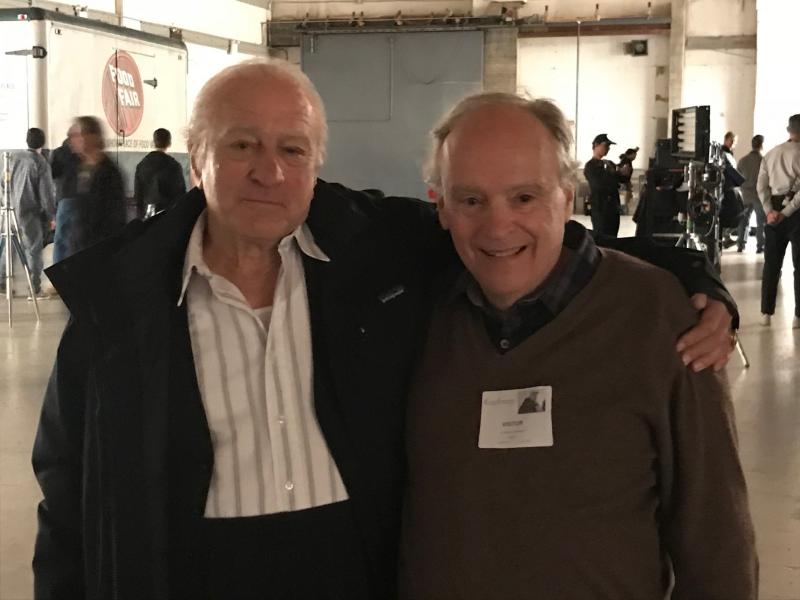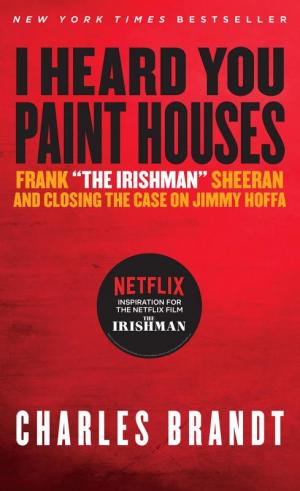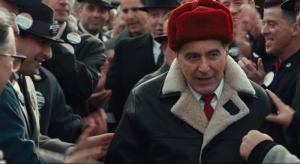Charles Brandt book behind 'The Irishman'
Charles Brandt's voice is hoarse from a cold, but he could also be losing it with all the interviews he's been doing lately.
The author of “I Heard You Paint Houses” and his wife Nancy Poole – a Lewes girl who lives part time in her childhood home on Pilottown Road – have had a whirlwind of activity this fall, attending coast-to-coast red carpet releases of “The Irishman,” Martin Scorsese's latest film, based on Brandt's book. The film features Robert DeNiro as mobster Frank Sheeran – the man who admitted he killed Jimmy Hoffa, played by Al Pacino – and is set for release on Netflix Nov. 27.
Brandt is affable, despite his cold, and generous with his time as he talks about Sheeran, whom he met after Brandt and his medical-malpractice law partner, Bart Dalton, sprang Sheeran from his 32-year prison sentence for racketeering.
Following Sheeran's release, Brandt said, the two had lunch at an Italian bistro where he learned Sheeran had read Brandt's earlier crime novel “Right to Remain Silent.” Sheeran told him how much he liked the novel, and that he wanted Brandt to write his memoir.
“Frank said he was tired of being mentioned in all the books about Hoffa. At that point, he was identified as a suspect in Hoffa's murder in all the books and all the articles,” Brandt said. “I immediately could tell he wanted to get something off his chest.”
Turned out that something was Sheeran's confession to the killing of Jimmy Hoffa, a Teamsters leader whose 1975 disappearance has been fodder for decades of speculation. Hoffa's body was never found.
In their first interview, Brandt said Sheeran talked for hours and just about gave him the whole story of what happened to Hoffa. But after Brandt showed Sheeran what he wrote, Brandt said, Sheeran had second thoughts.
“He turned pale. Russell Bufalino and a lot of dangerous guys he talked about were still alive. He said, 'You can't write this' and he took it from me,” Brandt said.
He didn't hear from Sheeran for eight years after that.
Investigative background pays off
Brandt, born and raised in New York City, is part Italian, part Irish and all gusto.
He is quick to credit others who have helped him along the way. One who crops up as Brandt talks about his life is an uncle who first got him a construction job at the New York Telephone Company building in Manhattan. The same uncle convinced him to get his bachelor's degree at University of Delaware, and after Brandt finished law school in Brooklyn, his uncle talked him into returning to Delaware to work as an attorney.
In 1971, Brandt promptly found employment in the Attorney General's Office, eventually running the office as chief deputy. He was also sworn in as a police officer, a practice allowed in the 1970s so that state attorneys could be involved in police investigations and crime scenes. Brandt said he also learned the art of interviewing from old-school detectives, and he earned a reputation as a person who could get confessions.
“It's based on a belief that people want to confess … the saying 'to get something off your chest' is a real phenomenon,” he said. “Interrogation is a journey from gaining trust to unburdening. And in the unburdening part, you point out to your subject that there is a physiological feeling of relief when you confess, and you feel it in your chest. And you point it out to him that the saying, 'get it off your chest' is real. It's a real phenomenon. And you point out to him how good he feels, 'Now doesn't that feel better?' And it does, and that encourages him to talk more and more and more.”
Brandt said he used those skills on Sheeran during the five years that he interviewed him, and the two developed a friendship that lasted until Sheeran's death in 2003.
In 1999, eight years after their first interview, Brandt said Sheeran called him and said, “I want to pick up where we left off.”
The rest is history. Brandt published “I Heard You Paint Houses” in 2004, detailing Sheeran's account of the years he worked for crime boss Bufalino, played in “The Irishman” by Joe Pesci. Through his mob ties, Sheeran rose to prominence in Delaware in the 1970s as the head of the Teamsters.
Brandt's life took another turn in 2007 when actor Robert DeNiro's office reached out about buying the film rights to Brandt's book. By then Brandt was living in Sun Valley, Idaho, with his mother, now deceased, who gave him words of wisdom that he has lived by since. “I rushed in to tell her the news, and she said, 'Look up, Charles, be grateful.' And I looked up with gratitude. She was the best,” he said.
Ten years later, Brandt spent a summer working with Scorsese, DeNiro and screenwriter Steve Zaillian developing the script for “The Irishman.”
“They treated me as a colleague,” he said.
Set up in a hotel within walking distance of Scorsese's Manhattan home, he found the experience both exciting and humbling. Every morning as he exited the hotel, Brandt said, the film director's home was to the right, but he would first turn left to see the New York Telephone Company building where he once walked beams, four stories high, for $65 a week.
“I would look at that building and remember that in 1960 when it was being built, I worked on that building and used to have to walk the beams to deliver messages. If I slipped, I'd be dead, but it was part of the job,” he said, in hindsight able to chuckle about it.
Brandt said he also remembered to look up and give thanks the same way his mother told him to after DeNiro's first call.
“So I would look down the block and look up at the building and, 'Look up, Charles,' a second time in gratitude from where I had come from and where I was,” he said.
Brandt said he has watched the movie twice now, and he loves it. He and Nancy attended red carpet affairs in New York and Los Angeles. Now, he said, they will be waiting to see what happens with the awards season. He doesn't want to jinx it, but he remains hopeful. “It's been thrilling. It's a masterpiece of a movie,” he said.
In December, he said, he and Nancy – whom he sweetly refers to as his editor – will travel to Italy for the release of his book there. Brandt said he is blessed by his success, but he has remained grateful throughout.
Before the interview ends, he gives thanks one more time, the same way his mother told him to in 2007.
“Excuse me, I have to look up. I have to 'Look up, Charles',” he says.
Melissa Steele is a staff writer covering the state Legislature, government and police. Her newspaper career spans more than 30 years and includes working for the Delaware State News, Burlington County Times, The News Journal, Dover Post and Milford Beacon before coming to the Cape Gazette in 2012. Her work has received numerous awards, most notably a Pulitzer Prize-adjudicated investigative piece, and a runner-up for the MDDC James S. Keat Freedom of Information Award.


























































